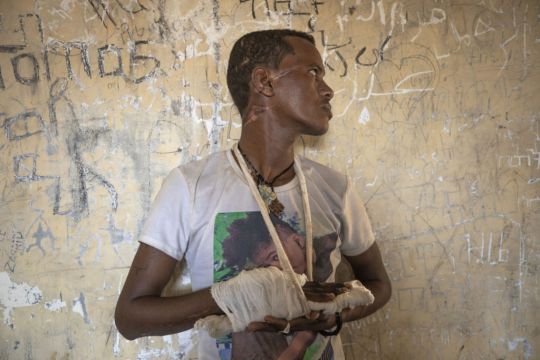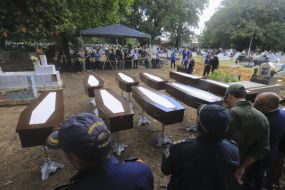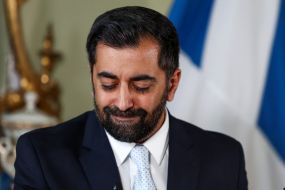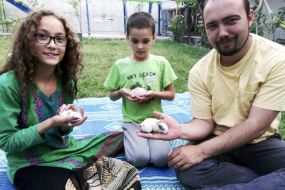The UN human rights chief Michelle Bachelet has said Ethiopia’s war has been marked by “extreme brutality”, as a joint investigation into alleged atrocities after a year of conflict found all sides had committed abuses.
The investigation was hampered by intimidation and restrictions by authorities, and did not visit some of the war’s worst-affected locations.
The report, a rare collaboration by the UN human rights office and the government-created Ethiopian Human Rights Commission, was released a day before the war’s one-year milestone as the country enters a new state of emergency with rival Tigray forces threatening the capital.

The UN told The Associated Press that the collaboration was necessary for its team to gain access to a troubled region that Ethiopian authorities have largely closed off to journalists, rights groups and other outside observers.
The conflict that erupted in Ethiopia’s Tigray region has killed thousands of people since the government of Nobel Peace Prize-winning prime minister Abiy Ahmed allowed soldiers from neighbouring Eritrea to invade Tigray and join Ethiopian forces in fighting the Tigray forces who had long dominated the national government before Mr Abiy took office.
Ethnic Tigrayans across the country have since reported being targeted with arbitrary detentions, while civilians in Tigray have described gang rapes, famine and mass expulsions.
New report on #Tigray conflict calls for accountability. All parties have committed violations of int'l human rights, humanitarian & refugee law, some of which may amount to war crimes and crimes against humanity. Perpetrators must be brought to justice: https://t.co/X6oycERVO7 pic.twitter.com/z3rVXdbyO0
Advertisement— UN Human Rights (@UNHumanRights) November 3, 2021
“In western Tigray, it was apparent that the Tigrayans had left most of the areas, as it was difficult to find Tigrayans to interview,” the report says.
The joint investigation covers events until late June, when the Tigray forces regained much of their region, but it failed to visit some of the deadliest sites of the war, including the city of Axum, because of security issues and other obstacles.
Notably, the report says, those obstacles included the Ethiopian government’s failure to release satellite phones procured for the investigation.
The investigation says all sides, including forces from the neighbouring Amhara region that have claimed western Tigray, have committed abuses which could amount to crimes against humanity and war crimes.

The report breaks little new ground and confirms in general the abuses described by witnesses throughout the war.
But it gives little sense of scale, saying only that the more than 1,300 rapes reported to authorities are likely far fewer than the real number committed.
Despite the report’s shortcomings, the prime minister’s office said in a statement that it “clearly established the claim of genocide as false and utterly lacking of any factual basis”.
The statement noted “serious reservations” about the report but claimed it laid “sinister allegations to rest”.
And it acknowledged the need to “redouble our efforts” to hold perpetrators accountable, pledging to form a high-level task force to this end.

The investigation found that several Ethiopian military camps were used to torture captured Tigray forces or civilians suspected of supporting them.
Others were detained in “secret locations” and military camps across the country, with arbitrary detentions in many cases.
The report also said Tigray forces detained some ethnic Amhara civilians in western Tigray in the early days of the war on suspicion of supporting the military, and in some cases tortured them.
Ms Bachelet, the UN high commissioner for human rights, said: “The Tigray conflict has been marked by extreme brutality.
“The gravity and seriousness of the violations and abuses we have documented underscore the need to hold perpetrators accountable on all sides.”

The report gives little sign that Eritrean soldiers were responsible for many of the atrocities, as witnesses have alleged from the earliest days of the war. Until March, Ethiopia’s prime minister denied they were even in the country.
“Some of the absolutely worst violations were committed by the Eritrean defence forces,” US Horn of Africa envoy Jeffrey Feltman said.
Ethiopia’s government imposed a blockade on Tigray since the Tigray forces regained control in June, cutting off almost all access for commercial goods and humanitarian aid.
That followed large-scale looting and destruction of food and crops across the region that “has had a severe socioeconomic impact on the civilian population”, the report says.
In addition, some camps for displaced people who fled the war did not receive food rations for months.
However, the joint investigation “could not confirm deliberate or wilful denial of humanitarian assistance to the civilian population in Tigray or the use of starvation as a weapon of war”.
It called for further investigation.

The new report, based on more than 260 interviews with victims and witnesses, said it had received no response from Eritrea’s government or from Amhara regional officials, and the Tigray forces expressed opposition to the involvement of the Ethiopian Human Rights Commission.
The report acknowledged that the presence of EHRC staff had at times inhibited interviews.
The investigation says the Ethiopian government should “consider” setting up a court to ensure accountability and the international community should “support” the government in restoring stability.
Ethiopia’s government has said it would pursue accountability for perpetrators, but the new report expressed concern that “investigations conducted by Ethiopian national institutions do not match the scope and breadth of the violations it has identified”.







